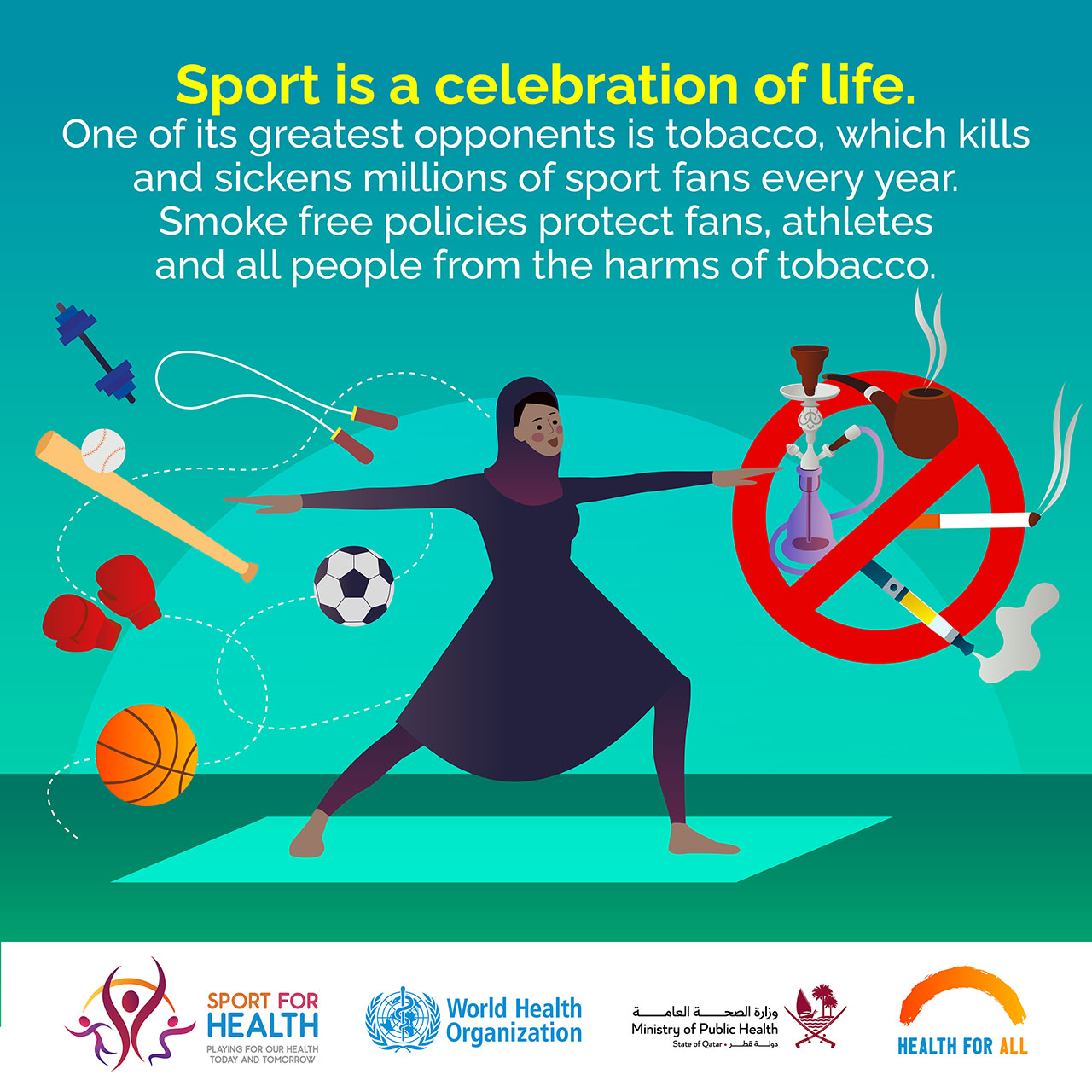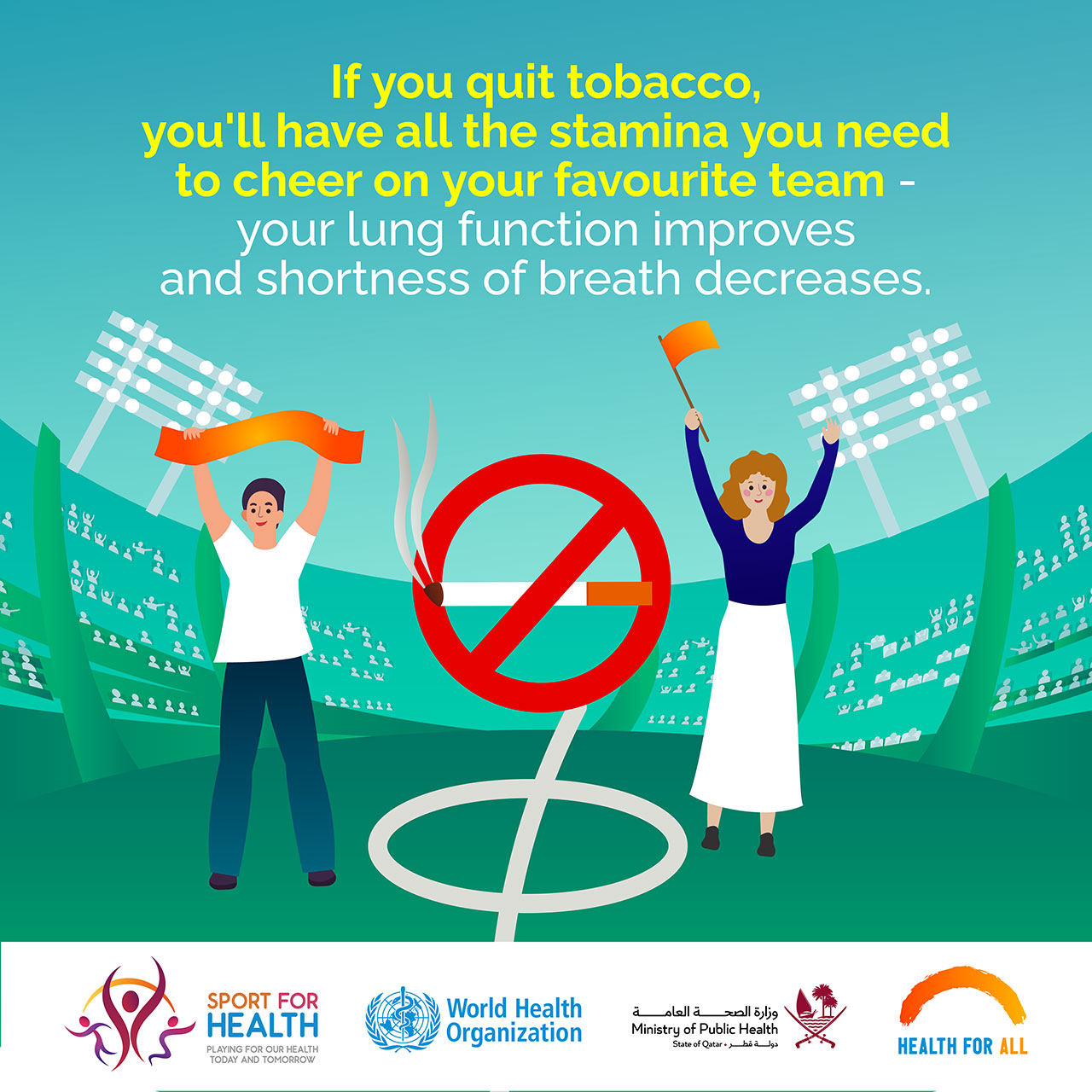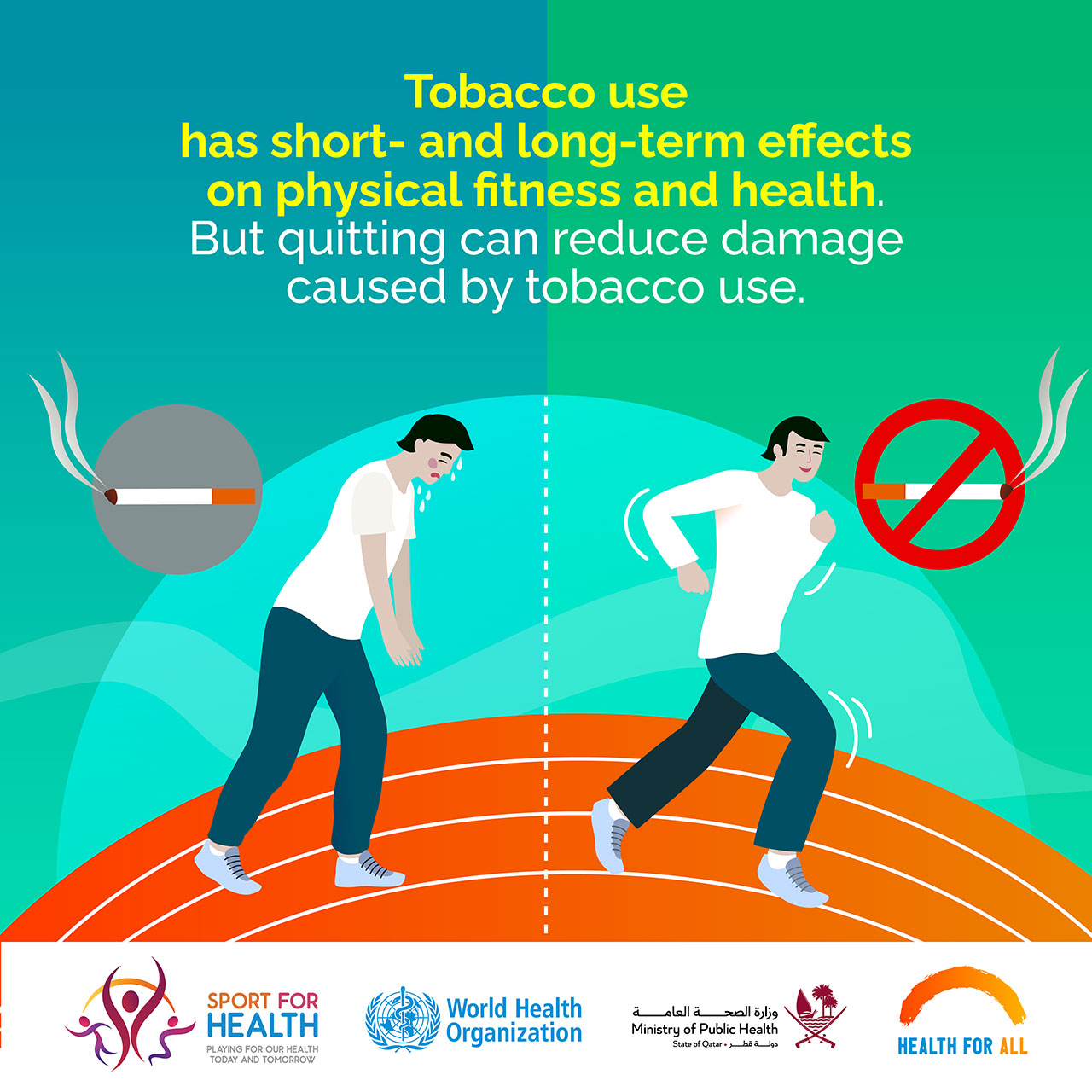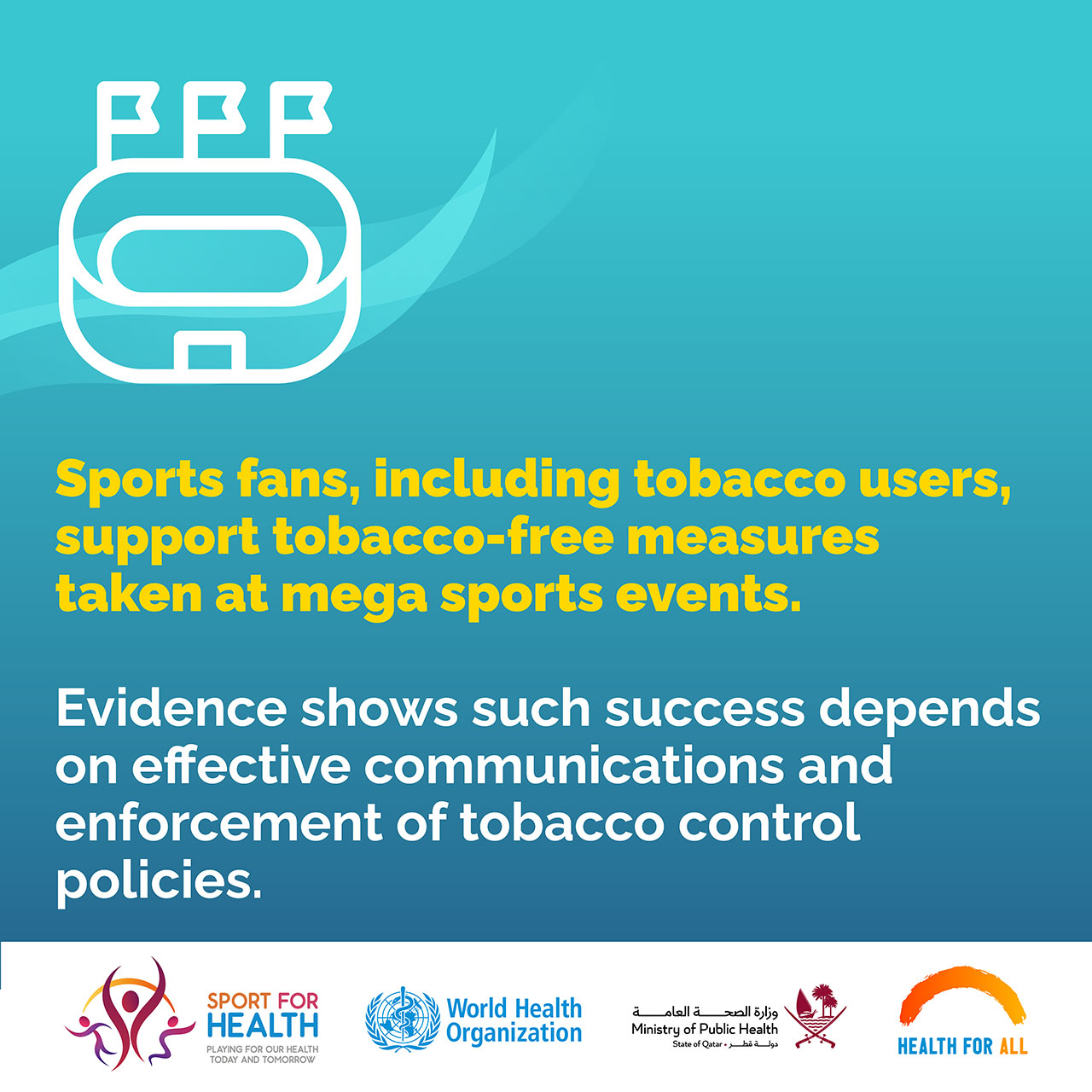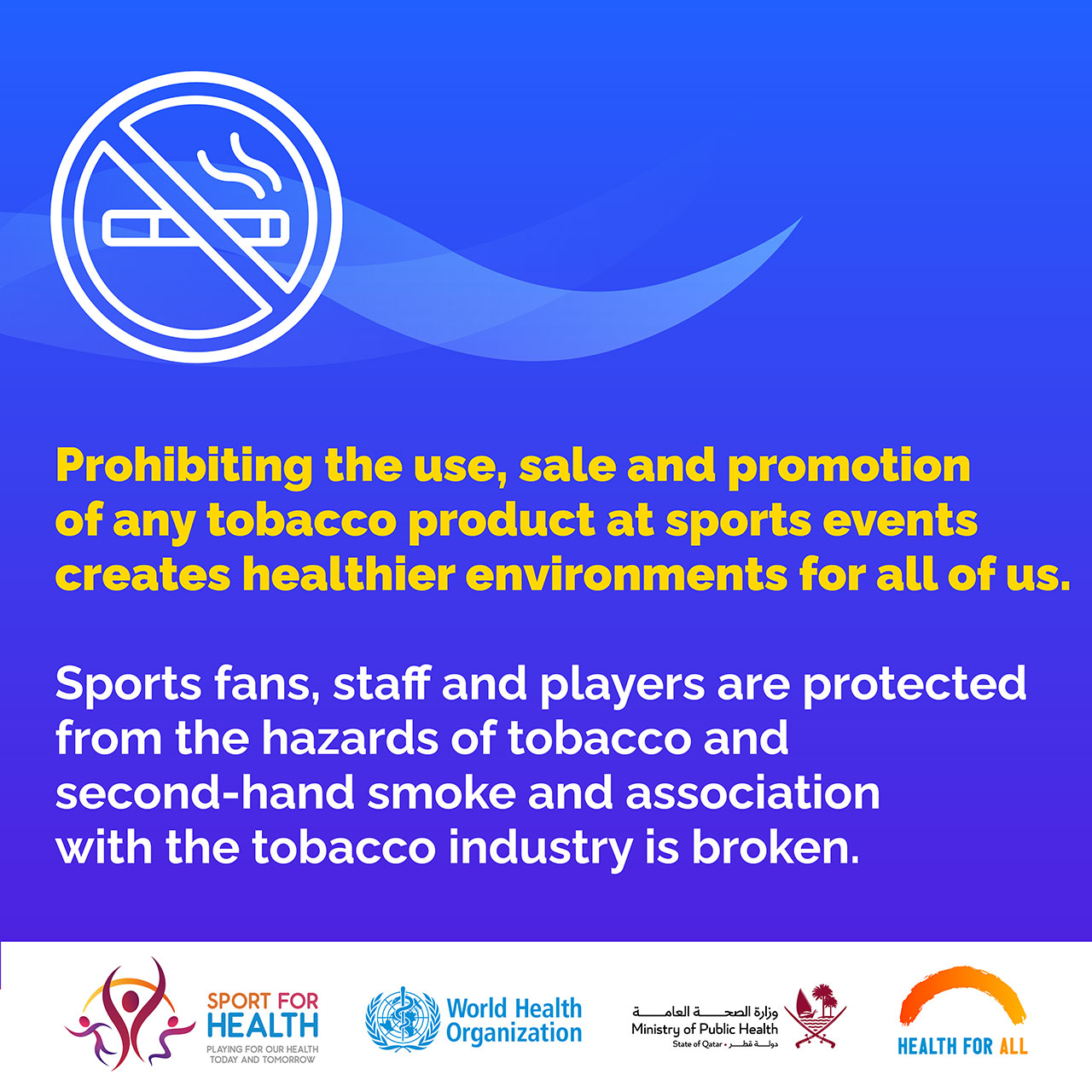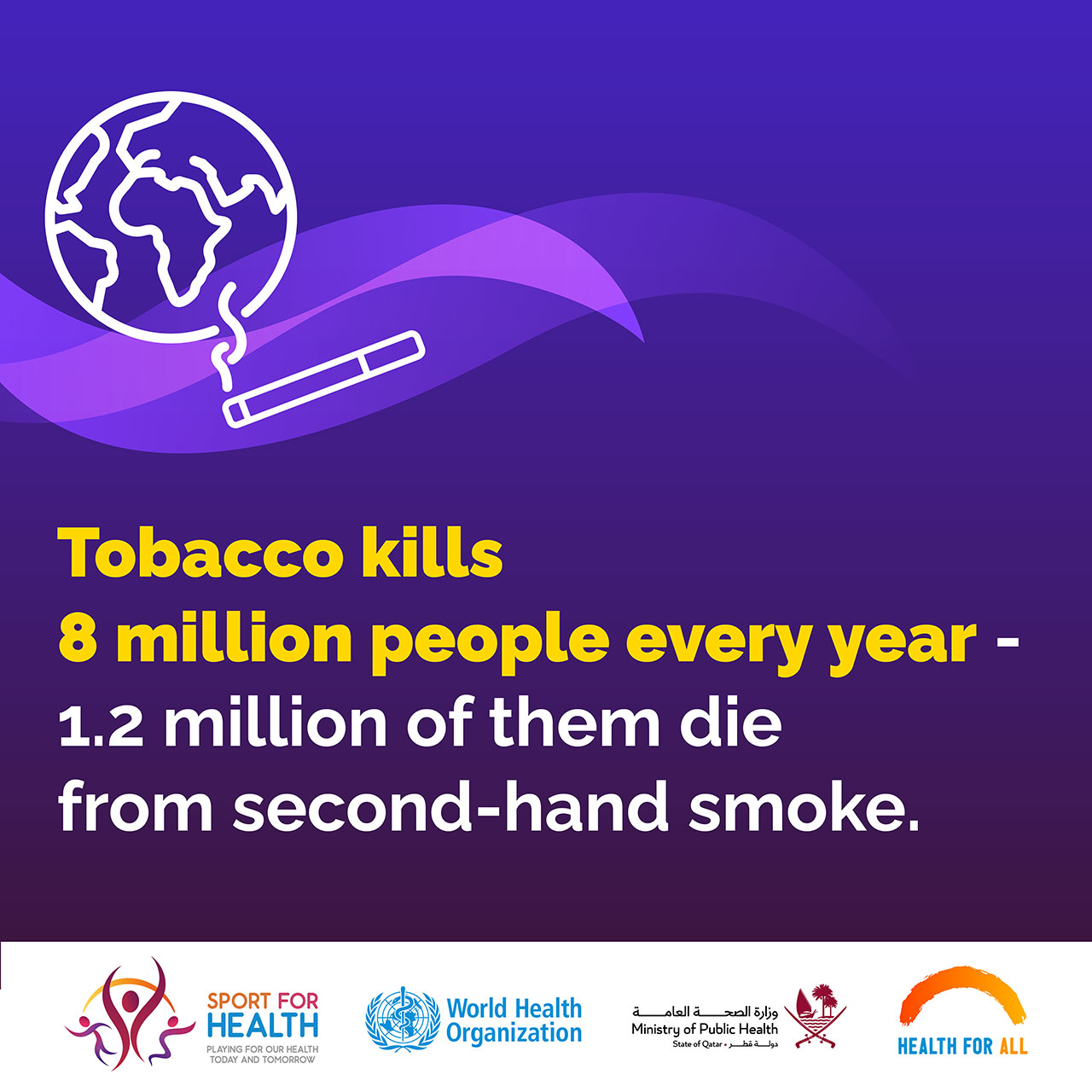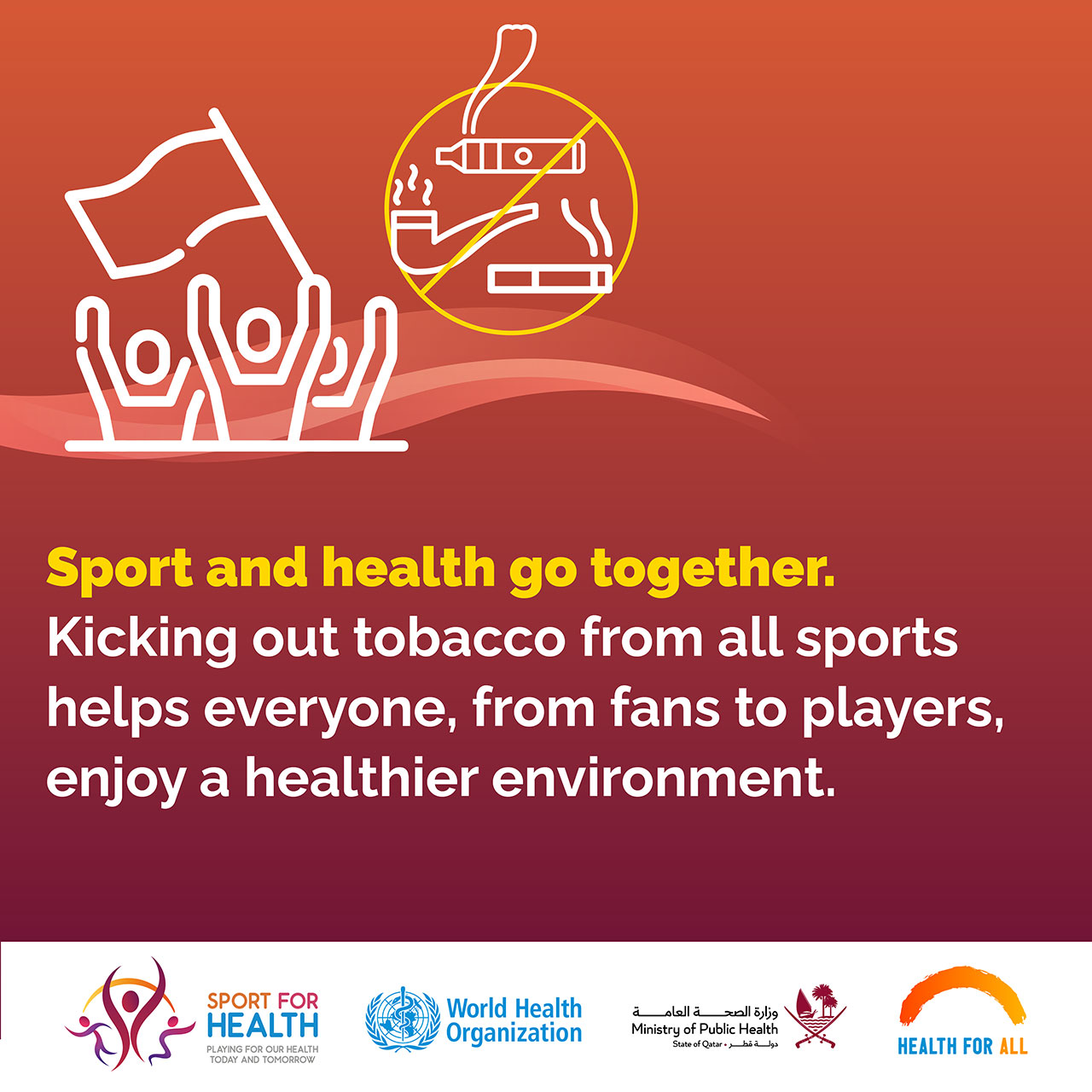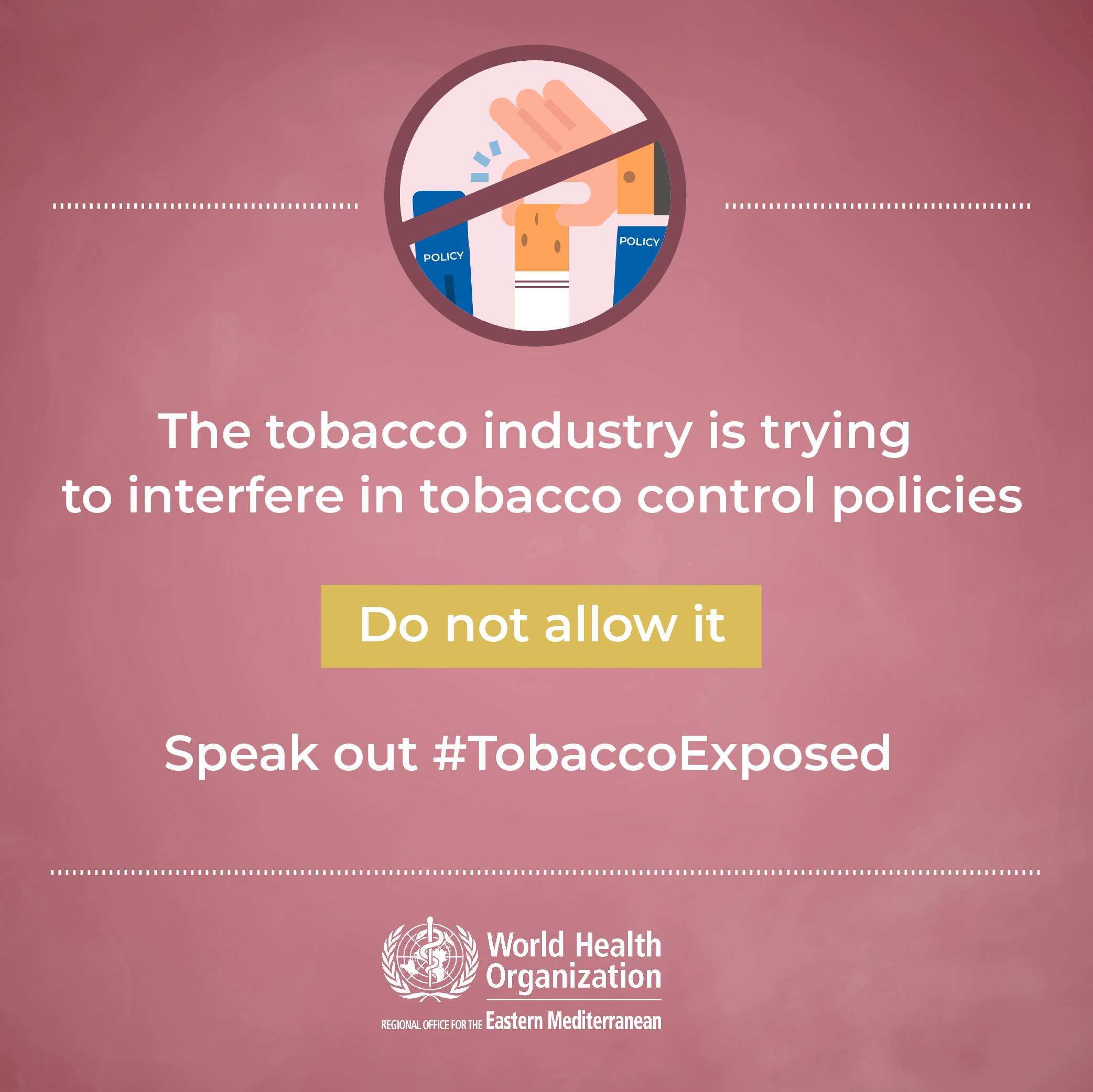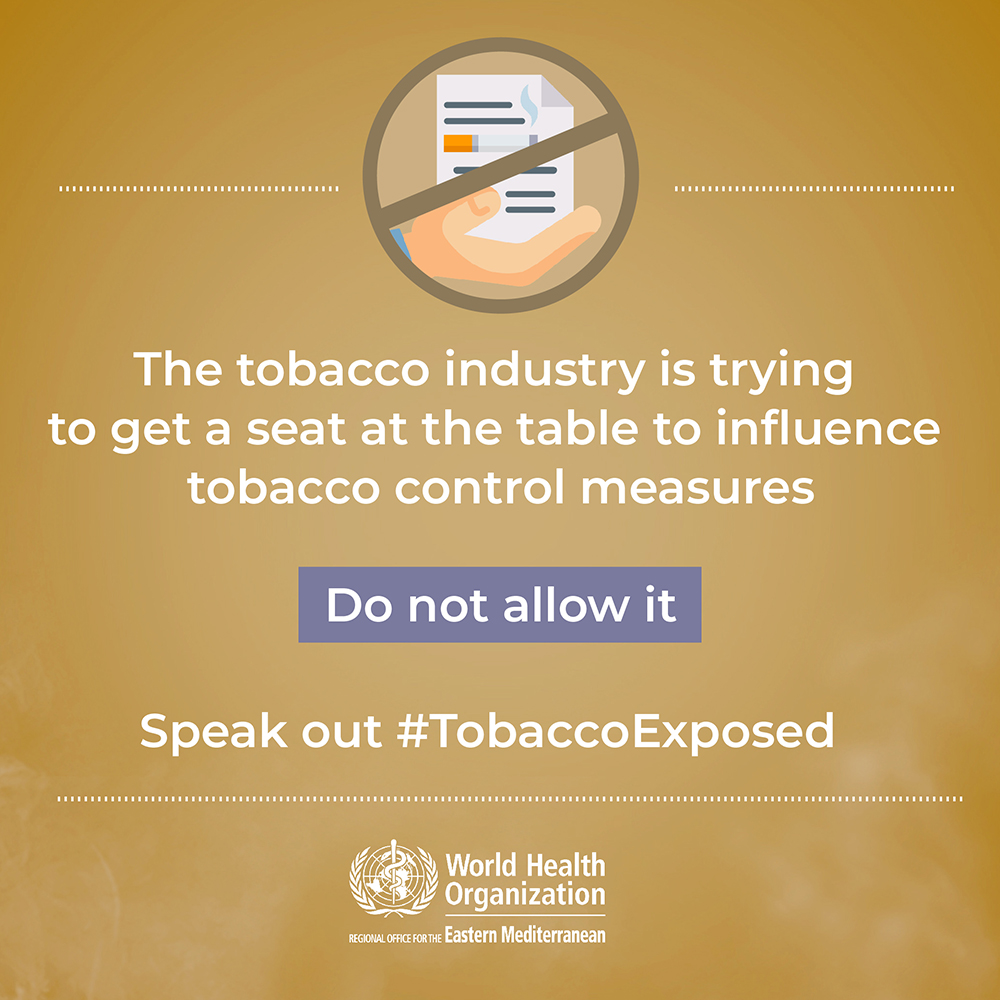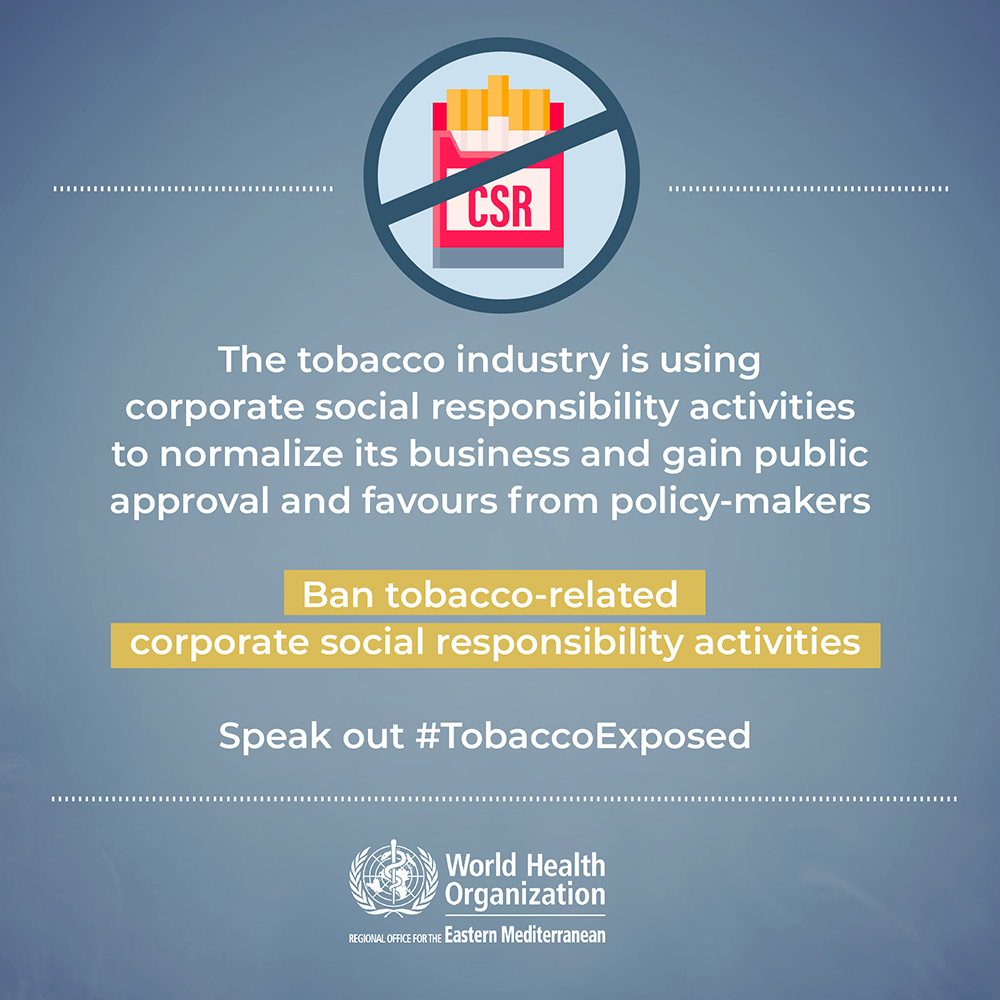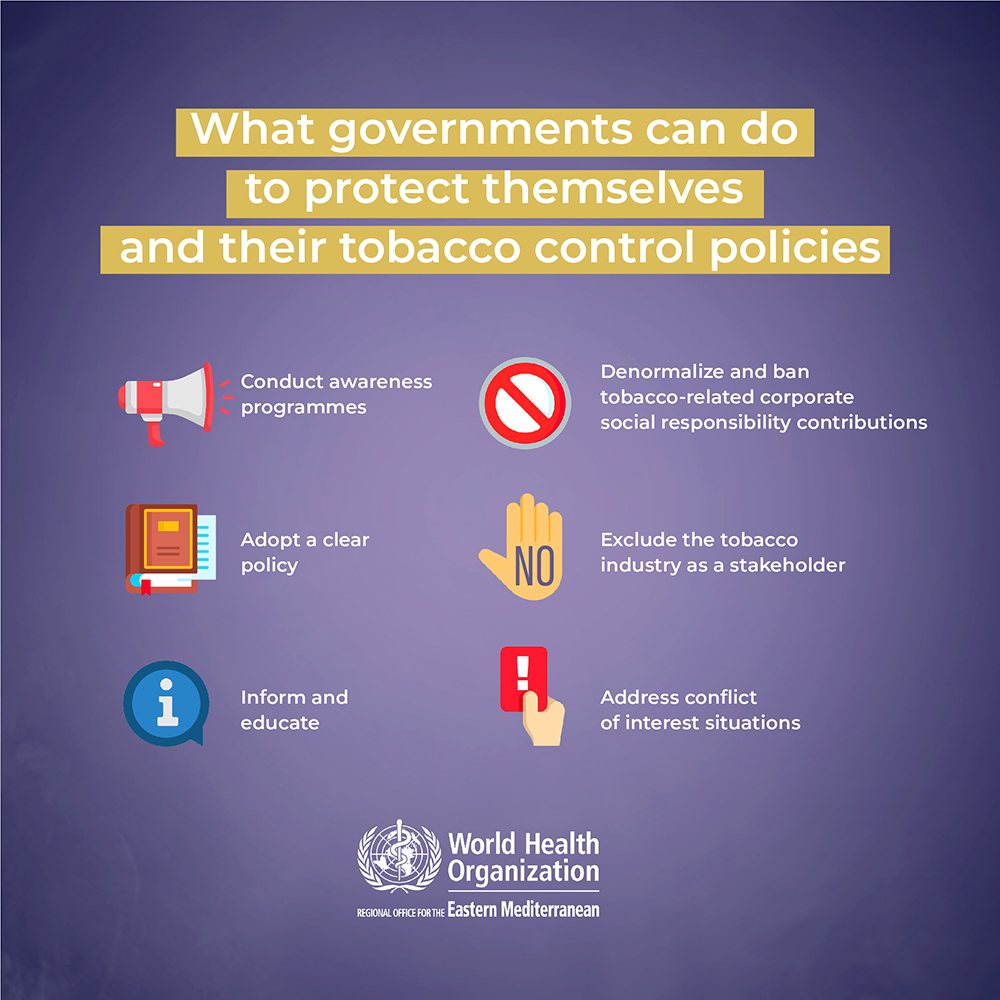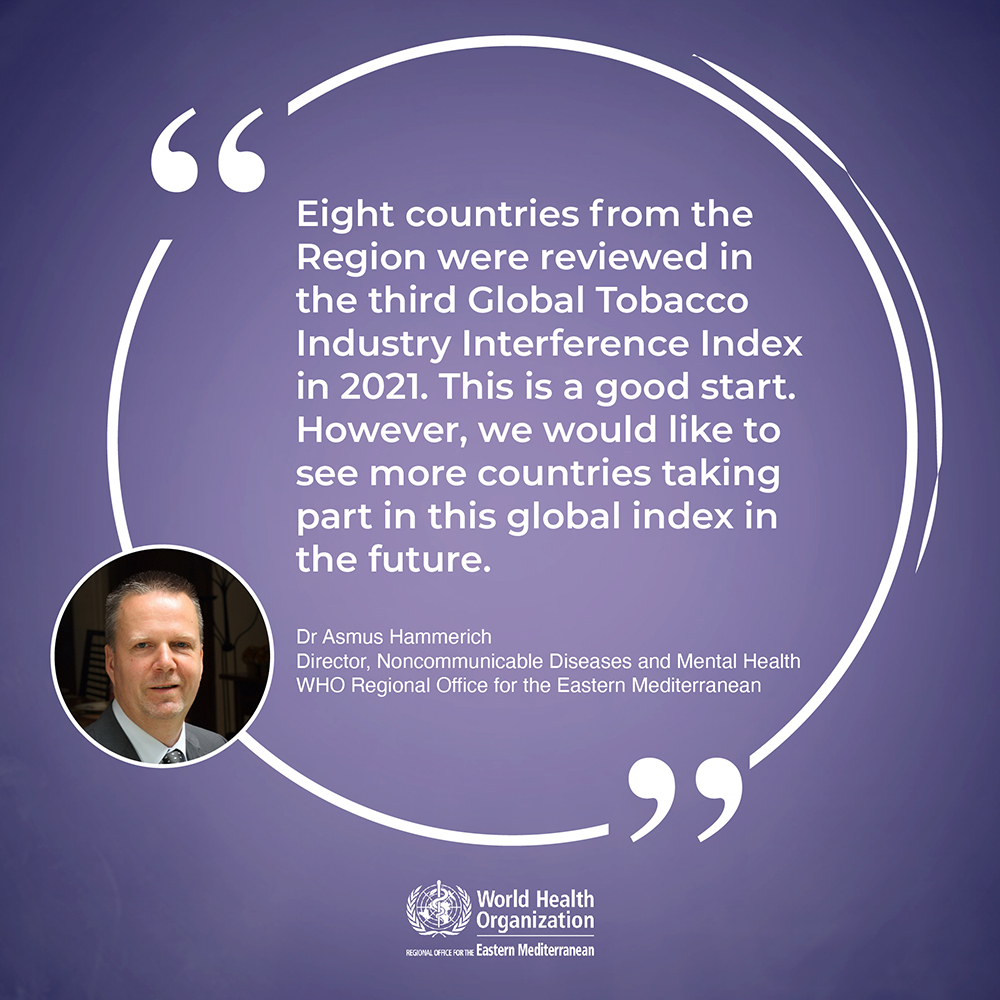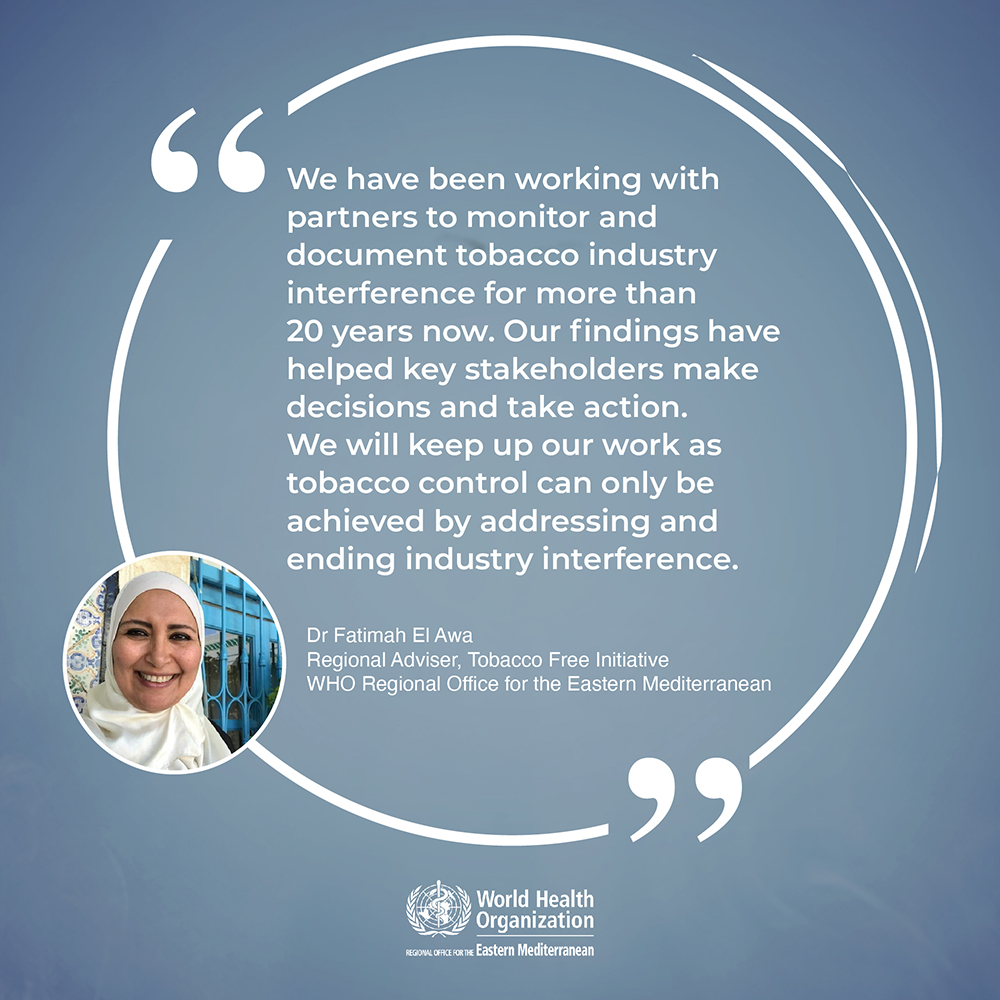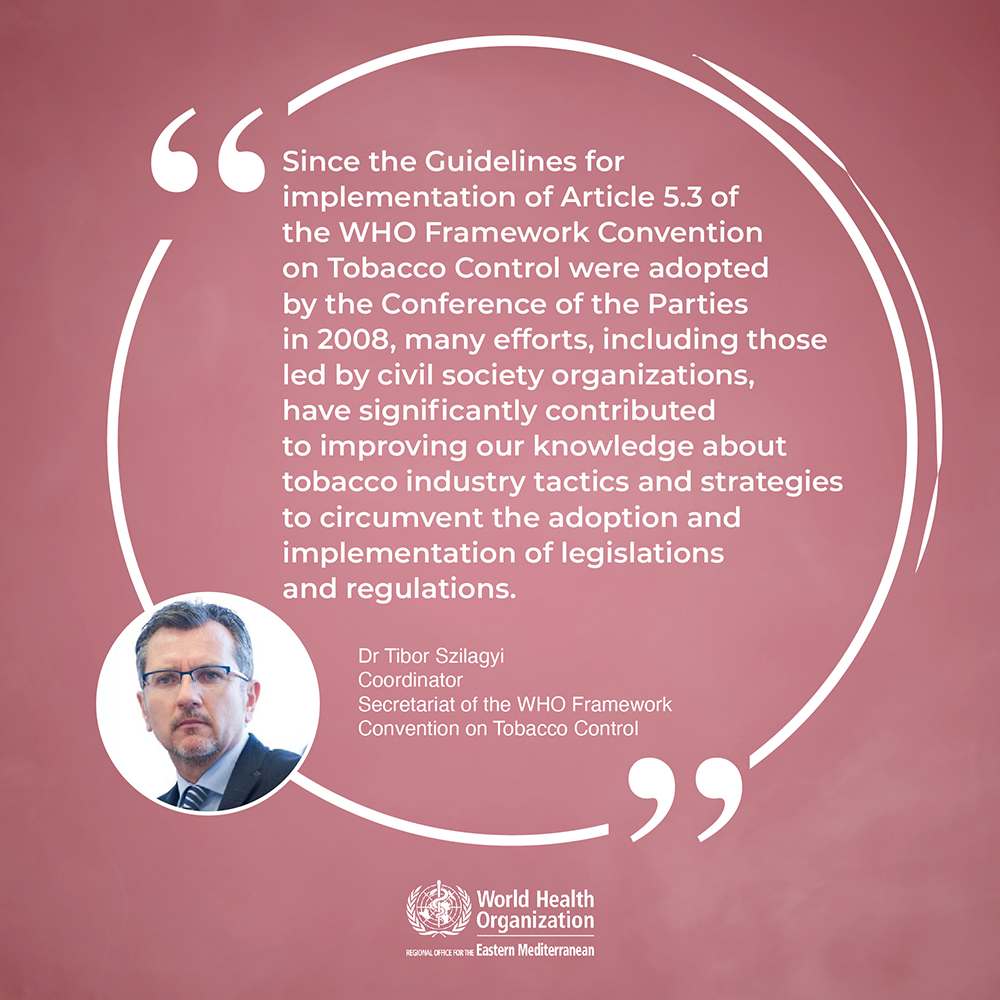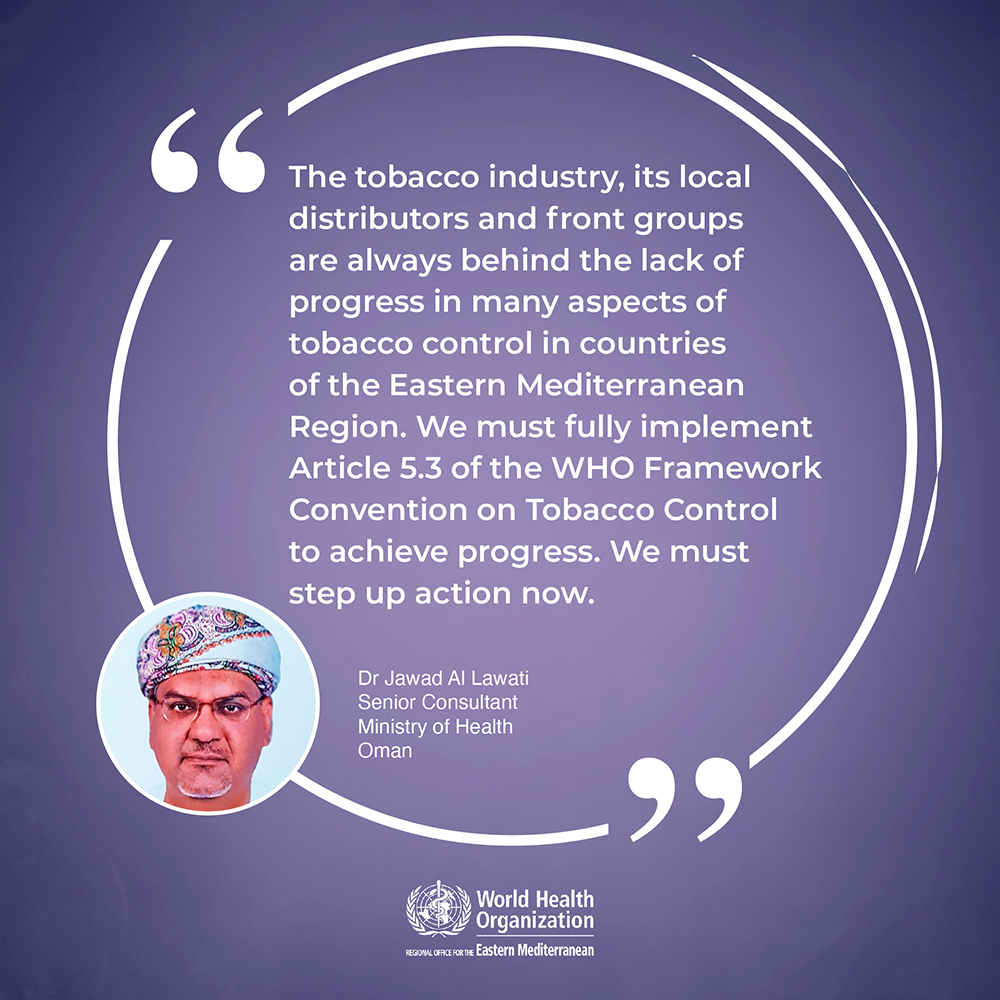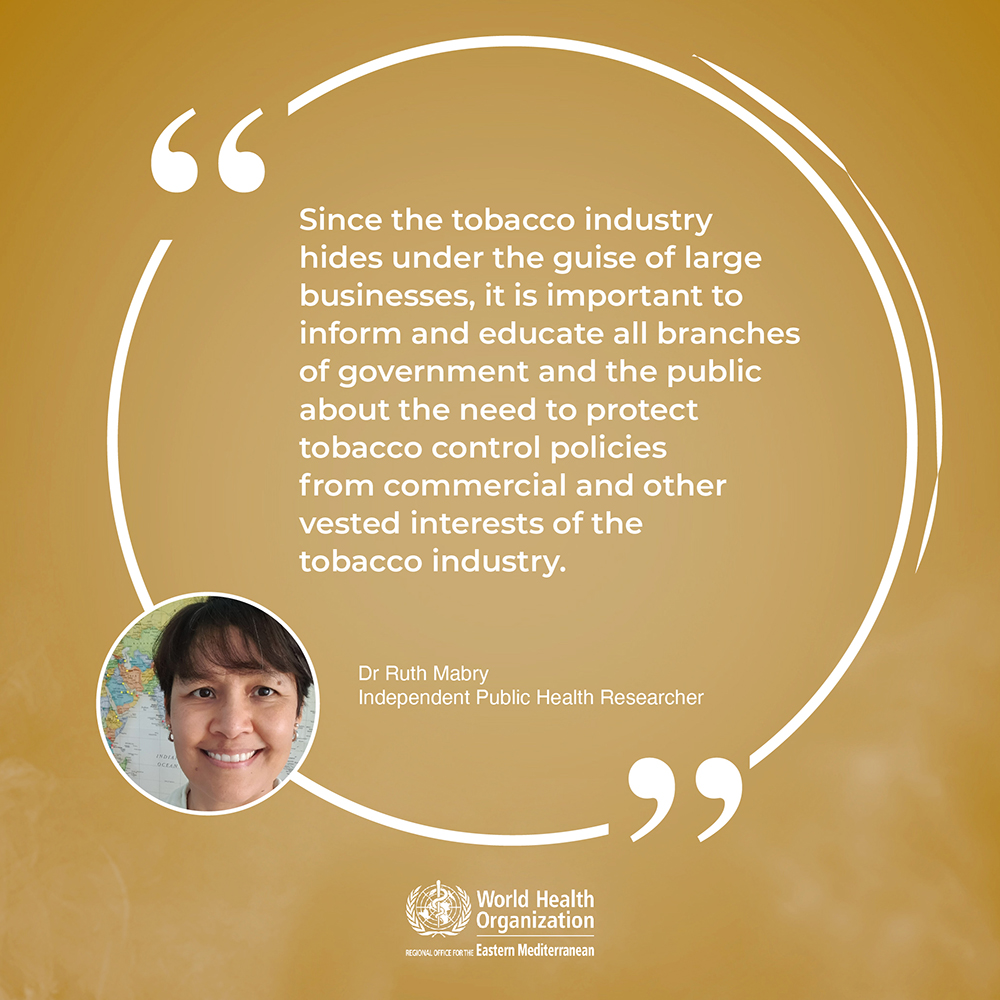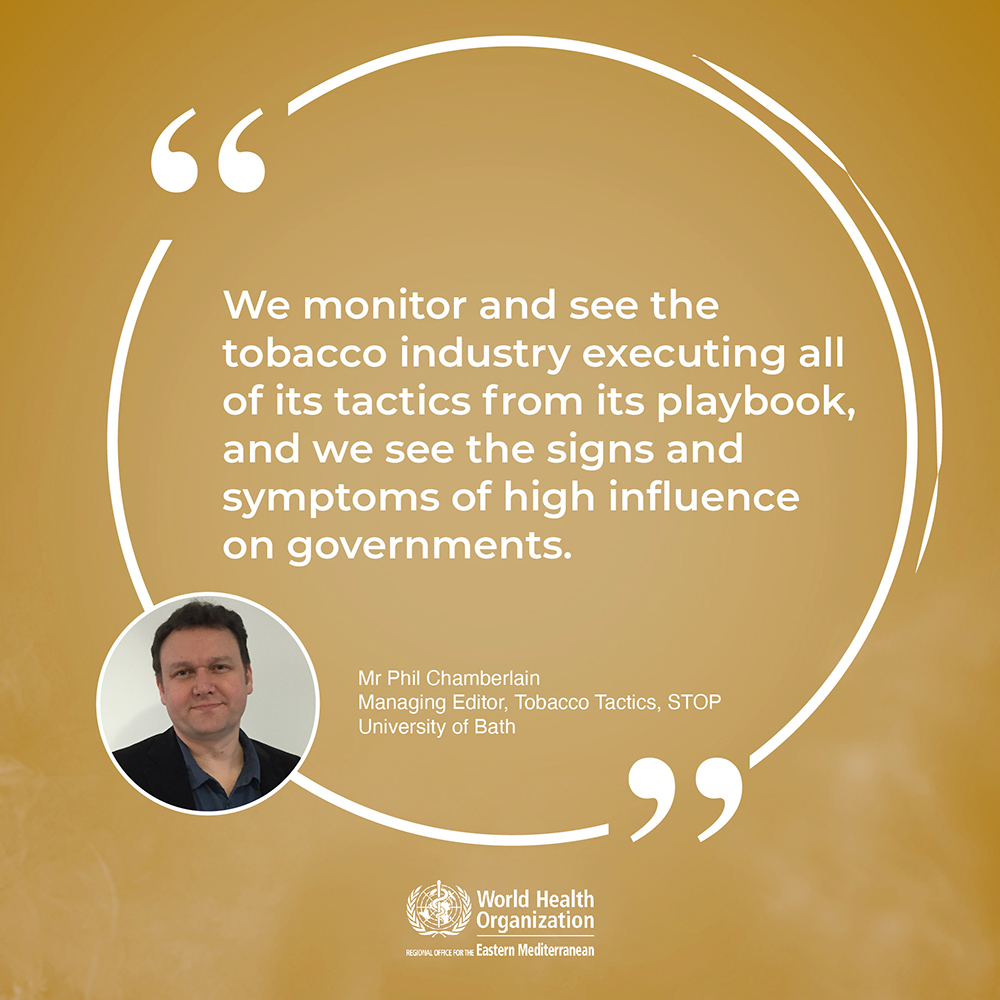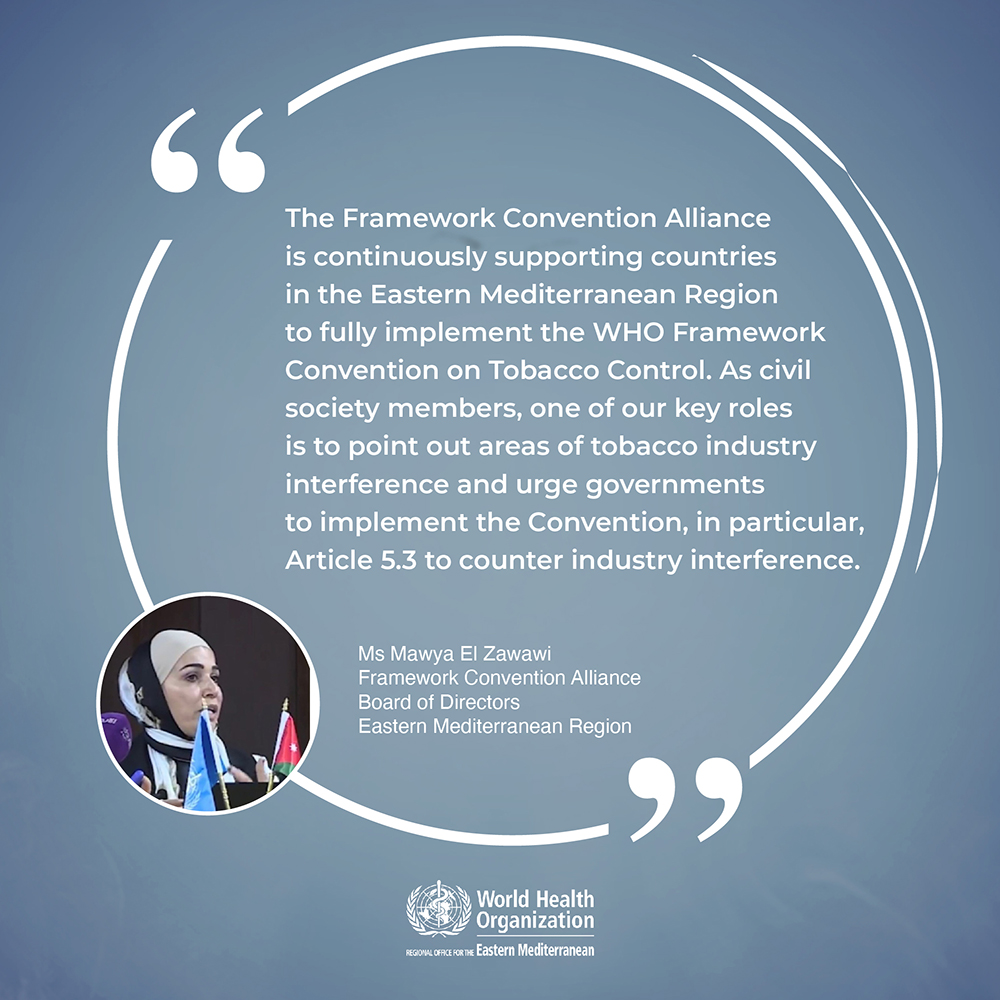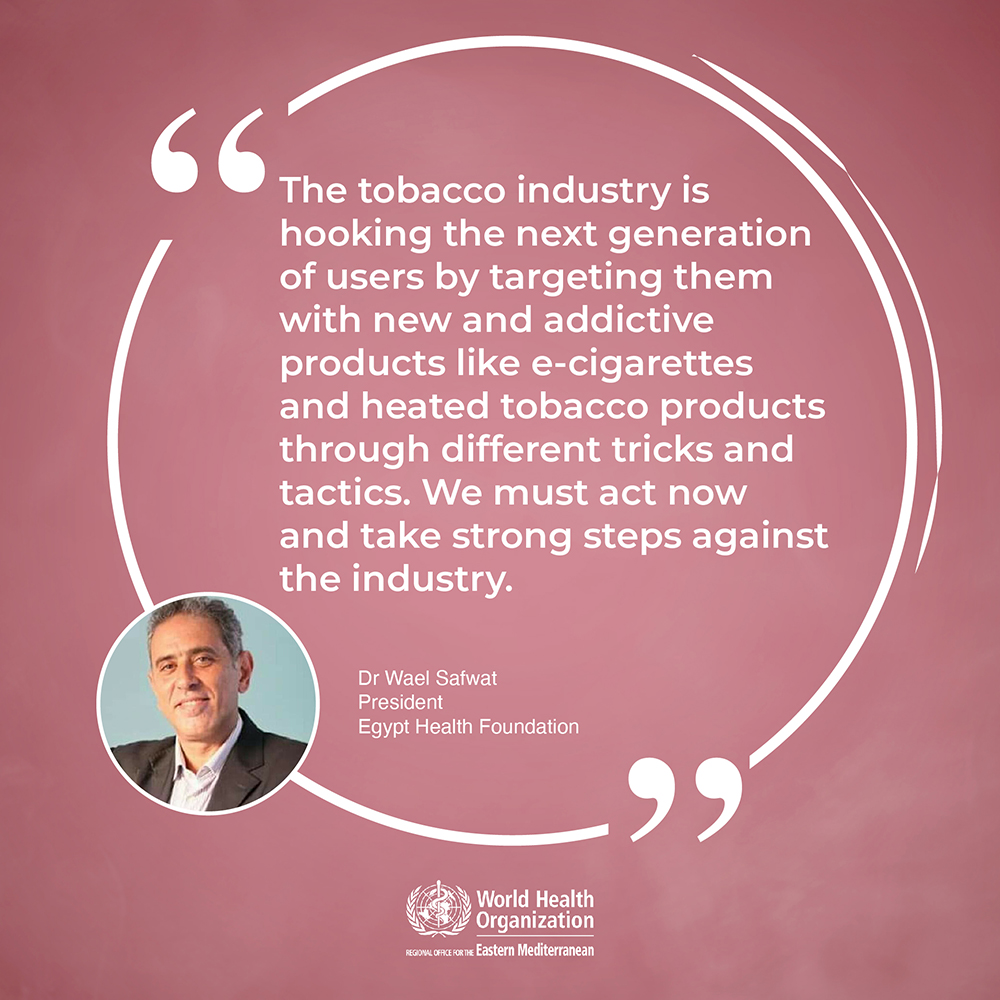Healthy FIFA World Cup Qatar 2022™
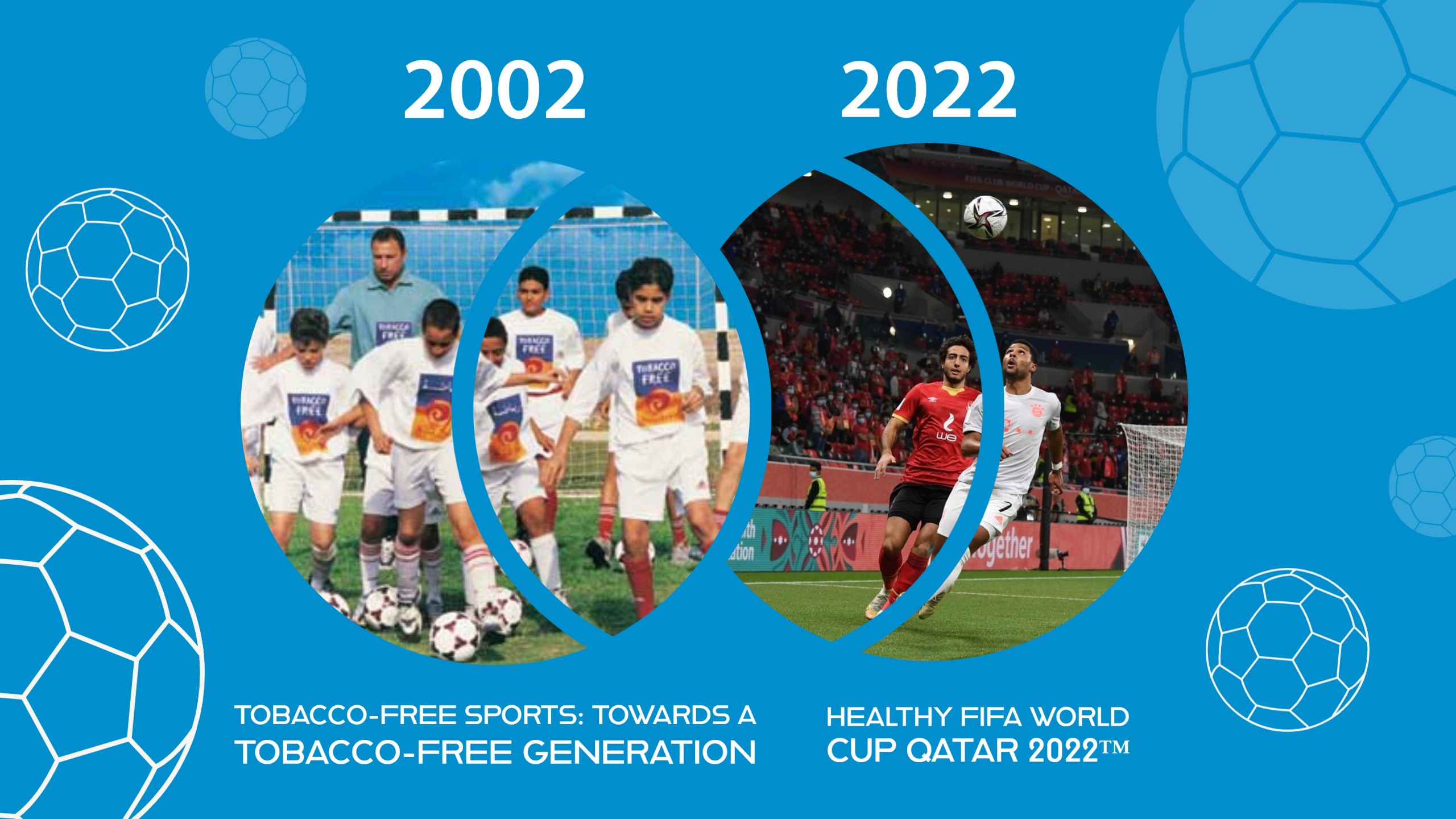
3 November 2022 | In 2002, the WHO Regional Office for the Eastern Mediterranean teamed up with former footballer Mahmoud El Khatib from Egypt and former cricketer Imran Khan from Pakistan on the Tobacco-free sports: Towards a tobacco-free generation campaign. The key messages of this campaign were:
Tobacco and sports do not mix.
Ban tobacco advertising, promotion and sponsorship.
Prohibit tobacco consumption and exposure to second-hand smoke.
Protect future generations from the preventable death and disease caused by tobacco.
Implement the WHO Framework Convention on Tobacco Control to save lives.
Health and healthy living is everyone’s right.
Now, in 2022, WHO and the State of Qatar have teamed up with FIFA on the Healthy 2022 World Cup project. Qatar will host the FIFA World Cup Qatar 2022™ from 21 November to 18 December 2022.
The project aims to ensure the tournament will be a healthy and safe event and that the measures implemented and lessons learned will support the delivery of healthy and safe mega sporting events in the future. The objectives of the project are to ensure both the delivery and legacy of a healthy and safe FIFA World Cup Qatar 2022™ by setting the event as an impactful, sustainable and lasting model that promotes integration of health, security and wellbeing for future mega sport events. The main pillars that the Healthy FIFA World Cup Qatar 2022™ project focus on are:
supporting people to practice healthy lifestyles, including through physical activity, healthy diets and tobacco cessation and control;
promoting health security, with a focus on ensuring mass gatherings and events are safe; and
advocacy and awareness-raising for health.
Tobacco cessation and control
Providing options for people to lead healthy lives is at the heart of health promotion, including through tobacco cessation and control, which is a priority of the Healthy FIFA World Cup Qatar 2022™ project. The project will promote ways for people to be able to quit tobacco, raise awareness of the importance of tobacco cessation, and show how tobacco cessation and control is beneficial to people’s health.
Nicotine contained in tobacco is highly addictive and tobacco use is a major risk factor for cardiovascular and respiratory diseases, over 20 different types or subtypes of cancer, and many other debilitating health conditions. Every year, more than 8 million people die from tobacco use. Most tobacco-related deaths occur in low- and middle-income countries, which are often targets of intensive tobacco industry interference and marketing.
Tobacco can also be deadly for non-smokers. Second-hand smoke exposure has also been implicated in adverse health outcomes, causing 1.2 million deaths annually. Nearly half of all children breathe air polluted by tobacco smoke and 65 000 children die each year due to illnesses related to second-hand smoke.
Heated tobacco products contain tobacco and expose users to toxic emissions, many of which cause cancer and are harmful to health. Electronic nicotine delivery systems (ENDS) and electronic non-nicotine delivery systems (ENNDS), commonly known as e-cigarettes, do not contain tobacco and may or may not contain nicotine, but are harmful to health and undoubtedly unsafe.
Quit with Florence
Florence is WHO’s digital health worker to help you quit tobacco. After a short conversation via video or text, Florence can help you build your confidence to quit smoking, make a plan, and recommend toll-free quitlines or apps. Speak to Florence to quit tobacco today. Tell your friends, family and co-workers about her. Florence also speaks Arabic, English, French, and other languages.
Quitting toolkit
Quitting tobacco and related products is hard, but with the right support and tools, you can do it! With professional support and quitting services, tobacco users double their chances of quitting successfully. You are losing a lot more than you think by using tobacco – your health, the health of your family and loved ones, the money you are spending, your looks, and so much more. Quitters are truly winners. Get tips from the Quitting Toolkit and start your journey today!
Social tiles | General public
Social tiles | Policymakers
Videos
Feature story
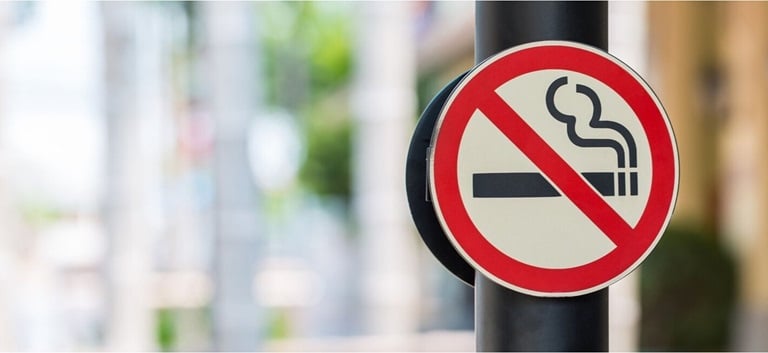
Strengthened regulation of tobacco-free venues at FIFA World Cup Qatar 2022™
Footballs won’t be the only things kicked in Qatar at the FIFA World Cup Qatar 2022™. Tobacco and e-cigarettes will also be kicked out of Doha’s eight stadiums, ensuring fans can enjoy smoke-free air while sitting in their seats watching world football’s biggest event.
Implementing tobacco and smoke-free measures at the FIFA World Cup™ has been the goal of a unique partnership between FIFA, the Government of Qatar and the World Health Organization (WHO) to make the tournament healthy and safe.
New and emerging nicotine and tobacco products pose challenges for tobacco control

12 October 2022 | Cairo – Vaping is a gateway to smoking. Data show that people who vape are five times more likely to become regular cigarette smokers, a habit that claims a life every four seconds.
The tobacco industry is using new strategies to fuel its multi-billion-dollar turnover. It is flooding markets around the world with new and emerging nicotine and tobacco products which it sells as “smoke free”, “less harmful”, “cleaner” and “safer” than their conventional counterparts, and claims can be used as effective cessation aids.
A side event – Report on the most recent data on emerging tobacco and nicotine products – held during the 69th session of the WHO Regional Committee for the Eastern Mediterranean offered an opportunity for countries of the Region to identify and agree on ways to regulate these products, based on international best practices and the recommendations of the Conference of the Parties (COP) to the WHO Framework Convention on Tobacco Control (WHO FCTC).
While the industry is using the concepts of “harm reduction” and “healthier alternatives to smoking” to justify unregulated entry of these new and emerging nicotine and tobacco products into national markets, the truth is these products typically contain nicotine and other toxic substances that can have harmful impacts on brain development and long-term consequences, particularly for children and adolescents.
Flooding the Region
These new products mimic the use of conventional cigarettes, reinforcing a behavioural pattern that can prevent those trying to quit tobacco from doing so successfully. They can even contribute to non-smokers, particularly children and adolescents, taking up conventional cigarettes.
In the Eastern Mediterranean Region, only one country is set to achieve the target of a 30% relative reduction in tobacco use by 2025. Other countries will only achieve a slight reduction, or may even see an increase in tobacco use, especially when new and emerging nicotine and tobacco products are flooding the Region.
In the face of increasing pressure from the industry to allow such products unregulated entry to markets, it is vital to scale up tobacco control efforts, especially when faced with the fact that vaping has reached more than 15% of young people in some countries of the Region.
Countries need to consider applying regulatory measures, based on international best practices and the recommendations of the COP to the WHO FCTC, prohibiting or restricting the manufacture, import, distribution, presentation, sale and use of new and emerging nicotine and tobacco products.
Video | New and emerging nicotine and tobacco products
Tobacco is poisoning our planet #TobaccoExposed
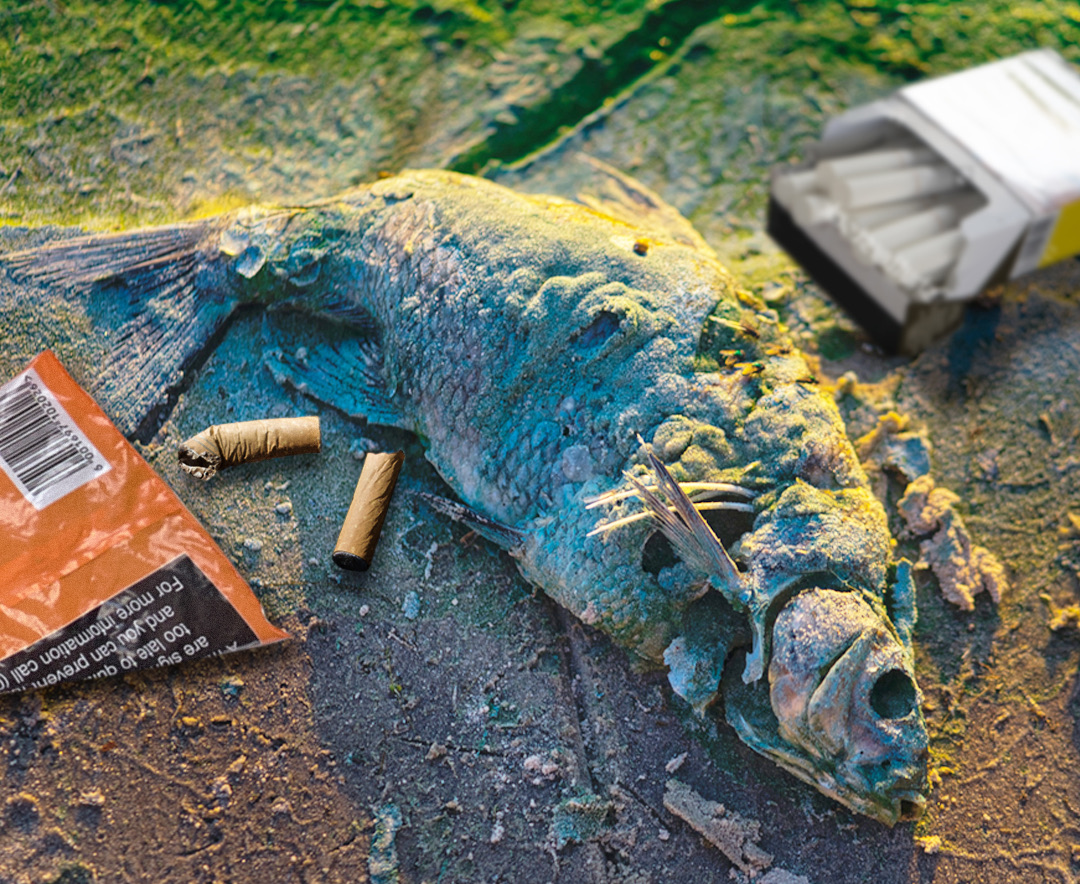
WHO and UNEP work jointly to put an end to tobacco’s harmful impact on our environment
31 May 2022 | On this World No Tobacco Day, the World Health Organization (WHO) Regional Office for the Eastern Mediterranean and United Nations Environment Programme (UNEP) are calling on governments and individuals to put an end to tobacco growing, manufacturing and use. Tobacco kills over 8 million people every year and destroys our environment, further harming human health, through its cultivation, production, distribution, consumption, and post-consumer waste.
"The harmful impact of tobacco on our environment is vast and growing” says Dr Ahmed Al-Mandhari, WHO Regional Director for the Eastern Mediterranean. “It is adding unnecessary pressure to our planet’s already scarce resources and fragile ecosystems”. Tobacco growing, manufacturing and use poison our water, soil, beaches and city streets with chemicals, toxic waste, cigarette butts, including microplastics, and e-cigarette waste. 600 million trees are chopped down to make cigarettes. 84 million tonnes of carbon dioxide emissions are released into the air, raising global temperatures. 22 billion litres of water are used to make cigarettes.
The tobacco industry
Deceitful tactics are also being used by the tobacco industry to “greenwash” its reputation and portray itself as a sustainable and eco-friendly industry. These tactics are used to hide the fact that tobacco farming, production, consumption, and use are detrimental to both the surrounding environment as well as the health of farmers and tobacco users. With an annual greenhouse gas contribution of 84 megatons carbon dioxide equivalent, the tobacco industry contributes to climate change and reduces climate resilience, wasting resources and damaging ecosystems.
“It is therefore essential to raise awareness on the tobacco industry’s contribution to the triple planetary crisis, not only on this day, but every day” says Sami Dimassi, UNEP Representative and Regional Director for West Asia. “We need to act now and at all levels. Let’s start today on World No Tobacco Day and keep going to World Environment Day on 5 June where we focus on #OnlyOneEarth and living sustainably in harmony with nature. These days and beyond are opportune platforms for all of us to speak out and expose the tobacco industry”.

Tobacco growing
Around 3.5 million hectares of land are destroyed for tobacco growing each year. Growing tobacco contributes to deforestation, especially in the developing world. Deforestation for tobacco plantations promotes soil degradation and “failing yields” or the capacity for the land to support the growth of any other crops or vegetation.
With about 90% of all tobacco production concentrated in the developing world, tobacco has an immensely uneven impact on different socioeconomic groups. In low- and middle-income countries, many farmers and government officials see tobacco as a cash crop that can generate economic growth, however, the short-term cash benefits of the crop are offset by the long-term consequences of increased food insecurity, frequent sustained farmers’ debt, illness and poverty among farm workers, and widespread environmental damage in low- and middle-income countries.
The regional framework on tobacco control
The regional framework for action on tobacco control, a road map for countries of the Region to implement the WHO Framework Convention on Tobacco Control, is central to accelerating tobacco control action. It sets out some of the strategic milestones that countries need to reach if they are to achieve the target of reducing tobacco use by 30% by 2030.
Calls-to-action
On this World No Tobacco Day:
Hold the tobacco industry accountable for destroying our environment and make them clean up the waste.
Help tobacco farmers switch to sustainable crops.
Continue to implement tobacco control measures.
Speak out and expose the tobacco industry. Countries can do so at the 27th session of the United Nations Climate Change Conference of the Parties, which will convene in November 2022 in Egypt. This is the first time the Region will host this conference, making it an opportune platform for countries to shed some light on the threat tobacco exacts on human health and the environment.
Quit tobacco to save our environment.
Contact us
Nisreen Abdel Latif (
Sabine Sakr (
WHO and Global Center for Good Governance in Tobacco Control launch new report on tobacco industry interference in the Region
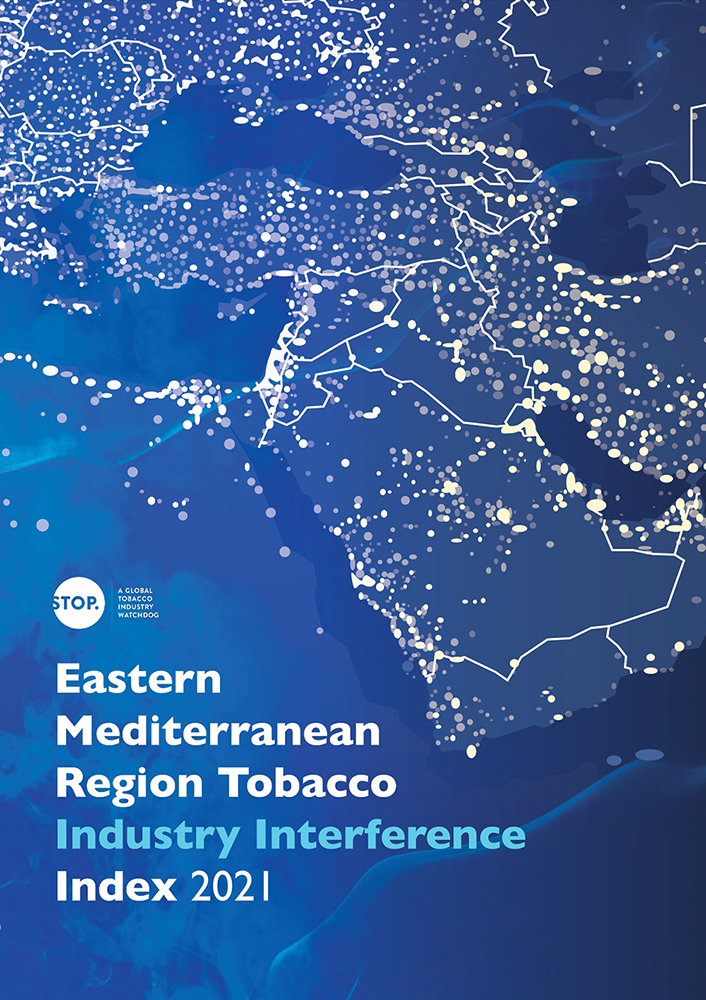
Increased action needed to better implement Article 5.3 of the WHO FCTC and its guidelines to stop tobacco industry interference and reduce tobacco use
21 February 2022 | The tobacco industry exploited the COVID-19 pandemic to expand its market for cigarettes as well as new tobacco and nicotine products. A new report on tobacco industry interference shows that the tobacco industry is interfering in policy development, conducting tobacco-related corporate social responsibility activities to whitewash its image, receiving incentives that prosper it, unnecessarily interacting with governments, taking advantage of loopholes to avoid being transparent and accountable, and making use of conflict of interest situations during the ongoing pandemic. The Eastern Mediterranean Region, like other regions, was not spared and experienced tobacco industry interference which undermined and compromised public health policy. WHO, the Global Center for Good Governance in Tobacco Control, Secretariat of the WHO Framework Convention on Tobacco Control (FCTC) and other partners, including focal points from ministries of health and WHO country offices, tobacco control advocates, academia and media are calling for increased action to better implement Article 5.3 of the WHO FCTC and its guidelines to stop tobacco industry interference and reduce tobacco use.
Eastern Mediterranean Region Tobacco Industry Interference Index 2021
The first Eastern Mediterranean Region Tobacco Industry Interference Index 2021 tracks progress of countries in their efforts in implementing Article 5.3 of the WHO FCTC and its guidelines. It was launched February 2022 in Egypt. This index shows that transnational tobacco companies are expanding in the Region through joint ventures and acquisitions. It also reveals that tobacco industry websites are vocal about how they see the Region as a lucrative market for their products and an opportunity for expansion. Moreover, this index shows that the local tobacco industry in the Region has joined the expansion bandwagon. This report also focuses on tobacco industry interference in policy development, tobacco-related corporate social responsibility activities to whitewash industry image, incentives that were received by and prospered the industry, unnecessary interaction between the industry and government, deterioration of transparency and accountability, and conflict of interest situations faced by public officials.
The WHO Regional Office for the Eastern Mediterranean has been monitoring and documenting instances of tobacco industry interference for more than 20 years now. The countries addressed in this report represent the continuation of these efforts that are much needed for policy-makers to make informed decisions on the implementation of Article 5.3 of the WHO FCTC and its guidelines. Eight countries from the Region (Egypt, Iran, Iraq, Jordan, Lebanon, Oman, Pakistan and Sudan) who participated in this index, recorded various forms of interference and governments’ responses to these instances of meddling. All eight countries participating in the survey are Parties to the WHO FCTC, meaning they have made commitments to implement tobacco control measures, reduce tobacco use and protect their health policies from interference from commercial and other vested interests.
This index has shown that countries continue to face serious challenges in implementation of Article 5.3 of the WHO FCTC and its guidelines. While some countries show a slight improvement in their scores compared to the data recorded in the Global Tobacco Industry Interference Index 2020, other countries have not made sufficient progress in their scores. This index is based on publicly available information and the details provided are a reflection of what has been found. It confirms the need for increased action to better implement Article 5.3 of the WHO FCTC and its guidelines to stop tobacco industry interference and reduce tobacco use.
Report recommendations
Governments can adopt the following measures to better protect themselves and their tobacco control policies:
Conduct awareness programmes specifically on Article 5.3 of the WHO FCTC and its guidelines for government departments more regularly.
Adopt a clear policy for the government in dealing with the tobacco industry that ensures transparency and prevents conflicts of interest. This can be a form of a code of conduct for all public officials to guide their interactions with the tobacco industry which should be limited to only when strictly necessary. Expand current code of conduct for members of the Tobacco Control Committee to cover whole of government to plug any loopholes.
Inform and educate all branches of government about the need to protect public health policies for tobacco control from commercial and other vested interests of the tobacco industry.
Denormalize and ban tobacco-related corporate social responsibility contributions as recommended in Article 5.3 of the WHO FCTC and its guidelines, and the Guidelines for Article 13 of the WHO FCTC. The tobacco industry uses corporate social responsibility activities to normalize its business and gain public approval and favors from policy-makers.
Exclude the tobacco industry as a stakeholder at any level or stage of health policy development. Terminate existing collaboration with the tobacco industry to conduct training programmes or law enforcement activities.
Address conflict of interest situations, apply policy coherence and fully commit to implementing the WHO FCTC to protect public health. Issue a policy on avoiding any preferential treatment to state-owned tobacco industry.
Adopt a procedure for disclosing records of all interactions with the tobacco industry and its representatives.
Related links
Eastern Mediterranean Region Tobacco Industry Interference Index 2021
Global Tobacco Industry Interference Index 2021
WHO Framework Convention on Tobacco Control








